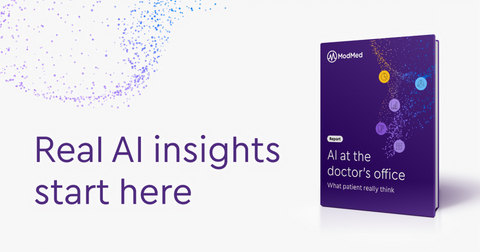A new ModMedⓇ survey reveals that while patients are cautious about AI in diagnostics, they support its use in administrative tasks to improve doctor-patient interactions
ModMed, a leader in healthcare technology, today announced findings from a new study on patient perspectives regarding AI use in medical practices. The survey of 2,000 US patients benchmarks public sentiment and expectations for specific AI applications in healthcare, specifically at the doctor’s office.
This press release features multimedia. View the full release here: https://www.businesswire.com/news/home/20250624882329/en/

Banner image of the "AI at the doctor's office" report with copy stating, "Real AI insights start here"
ModMed's findings show that while wariness persists around AI for diagnosis (55% uncomfortable), over half of patients (57%) now support AI, like ambient listening solutions, in the exam room if it means more face time with their doctor. These results represent a significant shift from early 2023, when Pew Research Center released findings from its survey1 that found that 60% of Americans were uncomfortable with their healthcare provider relying on AI, particularly in diagnostic capacities.
Importantly, the new survey also revealed how patients expect to be informed about AI's use across the practice — from check-in to the exam room to making payments — including what information they want to receive and how they wish to receive it.
Key findings:
- Patients will say “yes” to AI for more quality time with the doctor: A majority (57%) of survey respondents report their preference for physicians to leverage AI in the exam room for documentation if it means patients get more face time with their doctors. That desire is grounded in experience: three in four survey respondents (77%) said they spend less than 15 minutes with their physician in the exam room, and almost a third of respondents (28%) said that doctors spend 7-12 of those minutes focused on documentation during the visit.
- Some patients are receptive to AI use for administrative tasks, but not clinical decision-making: The survey, using a 'select all that apply' format, revealed varying levels of patient comfort with AI helping behind the scenes. For administrative tasks, respondents said they are open to AI helping behind the scenes — like appointment scheduling and reminders (35%), patient check-in (31%) or assisting with prescription refills (42%). But 55% say they're uncomfortable with doctors’ offices using AI to make a diagnosis or create a treatment plan.
- Patients expect strong guardrails around AI in healthcare: Most respondents want clear protections in place, as 83% say AI used for diagnosis and treatment should meet safety and accuracy standards, and 72% believe it's important to know the source of training data for an AI model.
- Patients want to know when AI is involved, and how. Transparency matters: 81% of respondents noted the desire to be told if their doctor's office is using AI at all, and 55% expect notification if AI is helping with diagnosis or treatment. Nearly half (46%) expect disclosure if AI is used for follow-ups like lab results, and 40% would prefer to hear about AI usage directly from their doctor or care team as opposed to others that prefer to sign a consent form (31%) or to review information on their doctor’s website (27%).
- Financial tools powered by AI need to earn trust: About one-third of patients (34%) are uneasy with AI accessing their credit card info, but most (57%) support it for speeding up claims processing. A smaller group (24%) would be comfortable with AI helping to appeal denied insurance claims.
Together, these insights offer a roadmap for healthcare organizations: patients are open to innovation, but only when it builds trust, increases connection and makes care feel more human.
"For too long, technology has put screens and paperwork between doctors and their patients," said Dan Cane, co-founder and co-CEO of ModMed. "Our vision is to remove those barriers. This lets doctors and providers focus on patients, knowing intelligent systems work quietly in the background, anticipating needs and streamlining processes. We believe this is the best way to truly unlock AI's potential in healthcare."
Cane added, "As this research suggests, patients want a more human-centered experience, and they see AI as a solution, provided it's transparent. We remain committed to delivering safe, responsible AI that genuinely improves experiences for both clinicians and patients."
For more insights, download the full AI at the Doctor’s Office Report: What Patients Really Think report.
Methodology
The survey was distributed by Talker Research to US patients over the age of 18 who have been seen by a doctor within the past year. A total of 2,000 responses were collected between Dec. 2 and Dec. 6, 2024. The survey was commissioned by ModMed and conducted online.
1"60% of Americans Would Be Uncomfortable With Provider Relying on AI in Their Own Health Care," Pew Research Center report (2023 February 22)
About ModMed
At ModMed, we empower medical practices to grow and scale by delivering better patient experiences with cloud, data and AI technologies. Leveraging extensive clinical data sets, we design intelligent software solutions to simplify, automate and streamline clinical workflows and drive practice efficiency. With our specialty-specific EHRs, practice management, revenue cycle management, and analytics solutions, as well as products for patient engagement, payment processing and marketing, we are trusted by over 40,000 providers to drive clinical and operational success. Learn more at modmed.com or our blog and connect via Facebook, LinkedIn, X (Twitter) and Instagram.
View source version on businesswire.com: https://www.businesswire.com/news/home/20250624882329/en/
Contacts
Press Contact
Patricia Babia
modmed.pr@highwirepr.com






